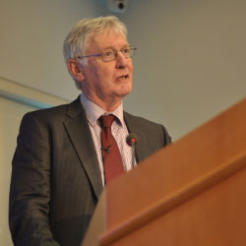Lord Wallace, the Cabinet Office spokesman in the House of Lords, sought to justify the tax relief cap yesterday by claiming that not all charities use their funds in a “public-spirited” manner, making the proposed cap necessary.
Speaking on behalf of the coalition government at Civil Society Media’s Question Time debate, the Liberal Democrat peer told the room full of charity representatives: “Let’s be honest – not every single charity is as public-spirited and determined to spend every single penny on public benefit as every other one.”
After many in the audience reacted to his statement with howls of derision, he added: “The man to my right [Lord Hodgson] is in the middle of a review of the Charities Act... and that will give us better evidence of this.”
Wallace was responding to a question by John Low, chief executive of CAF, on whether the tax relief cap was an indication that the coalition government's Big Society agenda was dead, and Charity Finance editor Andrew Hind's follow-up query as to whether minister for civil society Nick Hurd should have resigned over the issue. The Lord insisted that there is a tax avoidance problem in the UK, which members of the public are hugely concerned about.
But Labour’s civil society spokesman Gareth Thomas was not convinced, countering that no government minister has yet cited a single example of a “dodgy” charity that is benefiting from the tax relief cap.
A ‘stock’ solution
Thomas also said that implementing the charity tax relief cap was the “wrong strategic decision”, and that the government had hastily resorted to a “stock” solution suggested by the civil service in the last few days on the run-up to this year’s Budget. He said no one in government had thought about the impact that such a move would have.
“The current government has certainly made a mess of it,” Thomas said. “It made a decision to cut the top rate of tax, and then had to make the sums add up. Now charities are suffering as a result.”
Osborne 'won't give way'
Thomas also said it was clear that Chancellor George Osborne is not going to give way on the tax relief cap issue.
“The Office for Civil Society is now based in the Treasury,” Thomas told the room. “So George Osborne only had to pop down the corridor to get some advice about how the tax relief cap proposal would go down. The reasons for the measure have changed almost on a weekly basis; first it was tax avoidance, then it was an adverse European court ruling, then it was dodgy charities, and I think at the moment now it’s just dodgy foreign charities.
“The truth is that Osborne is determined not to back down or give way on this issue. Steve Hilton has tried to persuade him to back down, Vince Cable has tried, and so has Jeremy Hunt. None of them has got anywhere so far.”
NCVO chief Sir Stuart Etherington added: “If you work in the HMRC, you think that everyone is on the fiddle; it’s just the natural mindset that you have. Your job is to try to look into tax breaks, tax dodgers – and tax allowances, in order to make it simpler and to reduce tax avoidance.
"There wasn’t any sense of how consistent this [tax relief cap] would be with the avowed Big Society strategy of encouraging high-earning individuals to give more. The government will have to shift its position on this.”
Wallace added: “We are actively consulting with the sector and have plenty of time before the proposed implementation in 2013.”
Fraud claim ‘muddies the waters’
Daniela Barone Soares, chief executive of the Impetus Trust, told the panel that the government’s attempt to blame fraud for the cap was misleading.
“I think the argument is wrong in the way it has been put – a tax cap is not the way to address fraud, or tax avoidance. Because tax fraud is intolerable, there should be zero tolerance for fraud. What you’re doing with the tax cap is saying ‘We tolerate up to 25 per cent of fraud’. This is absolutely wrong.
“The reality here is that there is a philosophical decision by the government by doing that [implementing the tax relief cap] that is saying that no amount of relief should go to charities or to individuals, but actually part of it should always go to the government. That is the philosophy and that’s not what has been addressed in a constructive way; that would be a much more interesting debate than fraud which, I think, muddies the water.”








